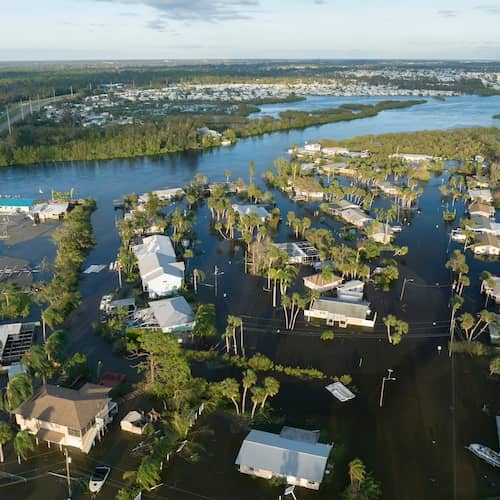Does home insurance cover natural disasters? What to know when filing a claim
Sep 2, 2025
•9-minute read

If your property is damaged due to a massive storm, forest fire, or other devastating event, knowing how to get things fixed so you can return to your normal life will make a tough situation less stressful. Filing a claim through your homeowners insurance might be a good option in this situation, so let’s equip you with everything you need to know about that process.
First, ask yourself the following questions:
- How do I evaluate the damage?
- Should I file a claim?
- What should I expect during the claims process?
Now, let’s get into providing you with some answers to these critical questions so you’ll be ready if the need arises.
The importance of evaluating the damage
When you get back to your home, try to evaluate the damage. If it’s safe to do so, take pictures in all the areas where there’s damage and take detailed notes about the disaster and the extent of the damage. Be as thorough as you can. The more information you can provide in your homeowners insurance claim, the better.
Why you should make temporary repairs
Whether you plan to file a claim, make any temporary repairs necessary to prevent further damage until permanent repairs can be made. If you decide to file a claim later, your insurance company will want to see that you’ve done what you can to mitigate the damage.
The steps you take will depend on the specific type of damage your home has sustained. Some common mitigation steps you may want to consider include:
- Preventing the spread of mold by removing wet carpeting and drywall
- Boarding up exposed holes
- Putting up temporary fencing to keep people from wandering into hazardous areas
Be sure to keep all your receipts for contractors and other professionals you hire. If you decide to proceed with the claims process, your insurance company may reimburse you for the cost of temporary repairs. However, don’t make any permanent repairs because your insurance company must first understand and verify the extent of the damage before it will approve your claim.
So, should you file a claim?
There are several factors to consider when determining if you should file a claim with your insurance company, the first of which is whether the damage is covered under your policy. If it’s covered, next you must decide whether the damage exceeds your deductible (the amount of money the insurance company requires that you pay before your coverage kicks in). If the repair cost is less than your deductible, there’s really no point in filing a claim because it won’t save you any money. If it’s more than your deductible, consider whether the difference is large enough for you to justify the claims process.
Coverages and exclusions in your policy
Before you consider filing a claim, you should know what’s covered under your homeowners insurance policy and what types of damage may be excluded from the policy. If the damage isn’t covered, it’s time to look at other resources. As an example, there are typically numerous sources of assistance available in a declared disaster area.
It’s important to know that specific natural disasters sometimes require their own insurance policy separate from your standard homeowners insurance. For instance, flooding isn’t typically covered within standard homeowners insurance policies. If you live in an area that’s considered a flood zone, lenders and mortgage investors like Fannie Mae, Freddie Mac, the Federal Housing Administration, and Veterans Affairs may require that you carry flood insurance to protect their investment. People who live in forested areas may need to have fire insurance for the same reason. The best thing to do if you’re unsure about what your policy covers is to contact your insurance provider.
Other common homeowners insurance exclusions
Beyond flooding in a flood zone and fires in a wooded area, many policies also require additional coverage for other, less frequent natural disasters like earthquakes and volcanic eruptions. You might be thinking that fire insurance would cover someone if a volcano burned their home, but that’s not necessarily true. Recently, homeowners policy issues arose in Hawaii after a volcanic eruption destroyed many residential communities. While fire coverage protected some homeowners, others had lava/magma exclusions in their policies.
Per the Claims Journal: “Some homeowners forgo policies that include lava coverage because they can cost more than $3,000 per year,” said Judy Moa, an insurance broker who has fielded many calls from anxious homeowners.
Does filing a claim make sense for you?
Still wondering if you should file a claim? Carefully consider the pros and cons before proceeding. It’s important to realize that once you file a claim with your homeowners insurance, your rates may go up. And unfortunately, in areas prone to forest fires or hurricanes, some insurance companies are dropping coverage for homeowners altogether. As the risk to homes increases, homeowners insurance companies face rising costs due to the increasing number of claims. Much like the insurance companies, you should look at the possibility of filing a claim as a risk vs reward equation.
You can start to figure this equation out by looking at your deductible. If the cost to repair the damage is only a few hundred dollars above the cost of your deductible, it may not make sense to file a claim. If the repair cost is thousands of dollars more than your deductible, a claim may be your best route. You’ll have to decide, based on your financial situation, how much you’re willing to pay out of your own pocket.
Of course, all of this relies on an accurate estimate of the damage to your home and the cost of repairs. A good way to get this is to have a contractor give you an itemized estimate for the repair. Sometimes your insurance company will provide you with an estimate, so contact them first. If they won’t get involved until you file a claim, find an independent contractor to give you an estimate.
When hiring a contractor to compile an estimate, consider the following:
- Is the contractor licensed, insured, and reputable? Look for reviews and ask them to give you references from previous clients.
- Make sure they provide an itemized list of all damage mitigation efforts and the cost of the work. There’s always the chance they’ll discover new problems, but the list should be as comprehensive as possible initially.
- You may have to pay for a contractor for an estimate, but never pay them up front to complete any work.
Use these tips to get an accurate estimate for the necessary repair work. Then you’ll be able to decide whether it’s worth it to file a claim.
The claims process
If you’ve decided it’s time to file a claim, you’ll want to know what to expect. Let’s go over the process and what you can do to make sure things go as smoothly as possible.
Contact your carrier
The first thing you should do if you’re looking to file a claim is contact your insurance representative. If you’re not sure how to contact them, call your mortgage servicer. They should be able to help you connect with your insurance carrier. If you’re a Rocket Mortgage® client, you can find the necessary contact information by signing into your Rocket account.
Once you’ve made contact, your insurance company will send an adjuster out to estimate the cost of the damage to your home, which will determine how much they will cover. If you have a dispute with the insurance company over the amount, you can hire an independent public insurance adjuster to provide an unbiased estimate. It’s worth noting that this may only be worth it if you have a significant dispute over the amount. That’s because public adjusters often get paid by taking a percentage of the settlement amount. You don’t want to get in a situation where you receive a slightly bigger settlement but end up with less money for repairs after paying the insurance adjuster.
Contact your lender
If you have a mortgage, you’ll need your lender to endorse any checks sent by the carrier to pay the contractors for repairs. Make sure they are up to speed on everything as you go through the claims process.
Depending on the amount of your claim, your lender may require that inspections be done once the work is completed to ensure it meets the previous standards. If the claim amount is high enough, your lender may require one or more inspections while the work is in progress. After all, they need to protect their investment.
If you’re a Rocket Mortgage client looking to file an insurance claim, you can get in touch with our Insurance Loss team at (866) 947-8425.
Relocation options
If you can’t live in your home while it’s being worked on, you’ll have to temporarily relocate. Some people even choose to settle with the insurance company and relocate permanently. Let’s go over your options in case you find yourself in this situation.
Temporary relocation
The type of lodging you look for will depend on how long you expect to be away from home. Timelines can change, of course, but your contractor should provide you with a pretty accurate timeline when you hire them.
If you’re only going to be out of your home for a relatively short time, like a few weeks or months, consider an extended-stay hotel or a short-term rental agreement for an apartment. If you’re going to need longer-term arrangements, like 6 months or longer, see if you can get a better deal by signing a longer-term lease. No matter what you decide, shop around to get the best possible deal. Make sure to keep any receipts or bills you receive, as your insurance company may reimburse your costs.
If paying for a hotel causes a short-term cash flow problem, the Federal Emergency Management Agency (FEMA) has a temporary hotel assistance program that may be helpful. The Red Cross also provides numerous natural disaster assistance services, including temporary shelter.
Permanent relocation
Homeowners insurance is intended to help get you back into your home and move forward with your life. However, you don’t necessarily have to move forward in your current location.
If you have a home that’s going to take a long time to repair, you have the option of settling with the insurance company and cashing out. The insurance company will still move forward with the estimate from their adjuster, but instead of applying that money toward the cost of home repairs, you can use it to pay off your current mortgage. You can use the remaining amount for a down payment on a new home. If you choose to go this route, you’ll need to be sure that you have enough money between your savings and the insurance claim payout to pay off your current mortgage and secure your next home.
FAQ
Hopefully, you now have a good understanding of filing an insurance claim after a natural disaster so you can make the decision that’s best for you. That said, questions may remain. Let’s dive into some frequently asked questions.
What natural disasters are covered by insurance?
That depends on your specific insurance policy. Some natural disasters are covered in your standard homeowners insurance policy, but others are not. Flooding, for example, often requires additional insurance coverage. You will likely need extra coverage for earthquakes as well. Contact your insurance carrier to find out what you are covered for.
How do I decide whether to file a claim?
Find out how much your insurance deductible is and how that compares to the cost of the repairs. If the cost exceeds the repairs, you don’t want to file a claim. If the repairs are significantly more expensive than your deductible, a claim is your best option.
How does insurance work after a disaster?
After a disaster, you’ll first decide if you want to file a claim. If you do, you’ll contact your insurer and go over your coverage. The next step is to make temporary repairs to avoid further damage. From there, you’ll prepare for the insurance adjuster and then determine your payout with the adjuster. Once you receive the payout, you can work with contractors to rebuild, if that’s what you’d like to do. During this time, you should communicate with your mortgage servicer and not wait for them to contact you.
Does insurance go up after a natural disaster?
Yes, your insurance costs can go up after you file a claim. Make sure it makes financial sense before proceeding.
Where do I go while my home is being repaired?
Investigate all the temporary housing options available to you. These may include a short- or long-term rental, or an extended-stay hotel. Ask your insurance provider if they will reimburse you for the cost of temporary housing.
The bottom line: Understand insurance claims after a disaster
When it comes to filing a homeowners insurance claim after a natural disaster, knowledge is power. Crunch the numbers to see if filing a claim makes sense for you, familiarize yourself with the process, and lean on the experts like your insurance representative, lender, and contractors. Life can surprise you with a rough turn, but being ready can help you navigate your way back home. For more info on mortgages, loan types, and home buying, visit the Rocket Mortgage® Learning Center.

Carey Chesney
Carey Chesney is a Realtor®, the co-owner of Chesney Team Realtors, and a contributing writer for Rocket. His writing focuses on the real estate landscape including home buying/selling, investment properties, and commercial real estate. Carey received his Bachelor's in English at University of Wisconsin-Madison and his Masters in Integrated Marketing & Communications at Eastern Michigan University. He lives with his wife and 3 children in Ann Arbor, Michigan.
Related resources

7-minute read
What is homeowners insurance and how does it work?
Mortgage lenders require homeowners insurance, which reimburses you if your home is damaged or destroyed. Learn how to choose the right policy for your home.
Read more

4-minute read
Pest inspection: Is it a requirement to get a mortgage?
A pest inspection may be required or advisable when buying a home. Learn when a pest inspection is needed and what a pest inspector will look for.
Read more
7-minute read
Buying a house with mold: What you need to know
Finding out a home has mold doesn’t have to be a dealbreaker. Learn how mold can affect your health and property and the steps you can take to manage i...
Read more